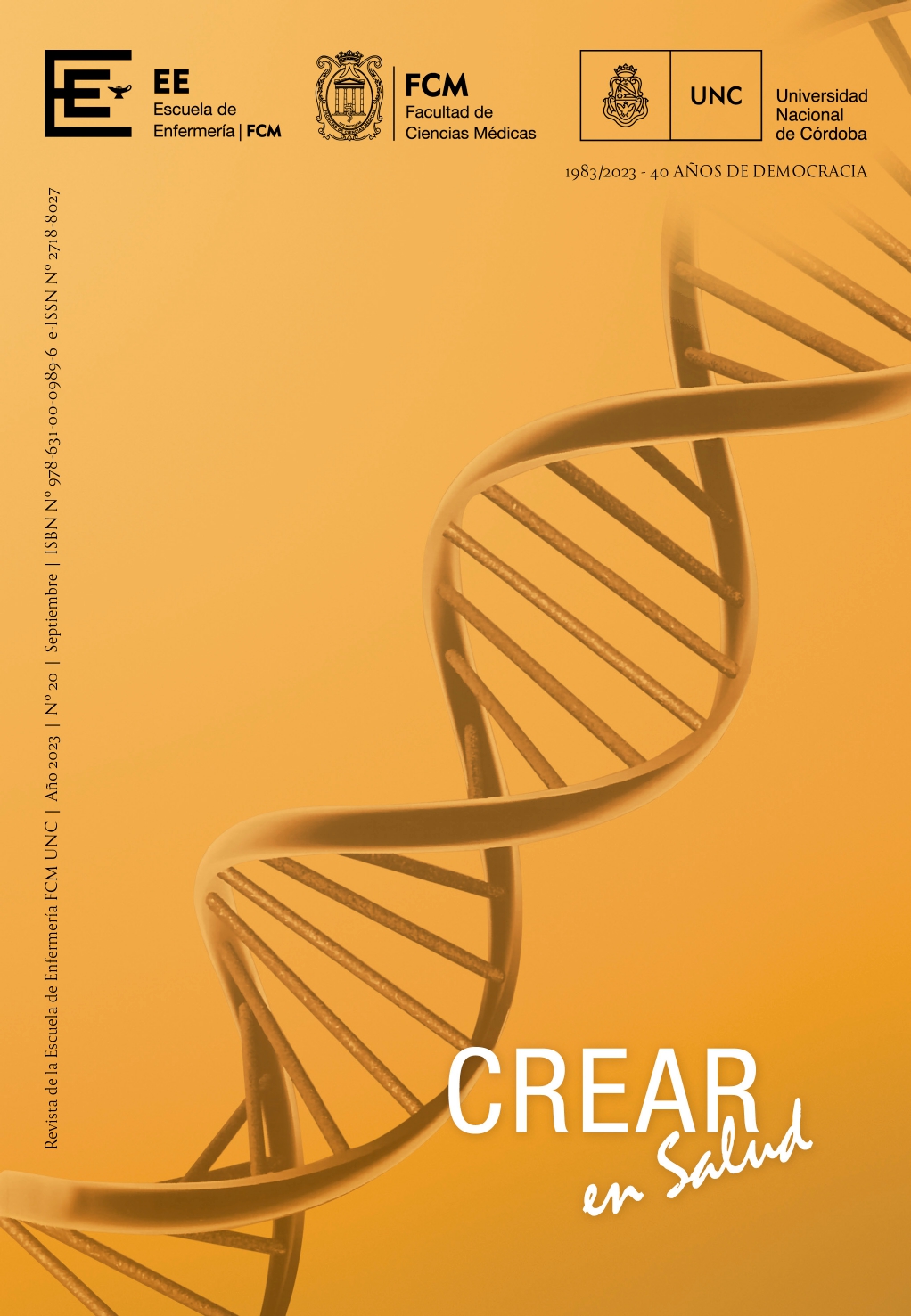Experiences of undergraduate nurding licentiate course students during the adoption of the 2018 undergraduate currriculum
Keywords:
Keywords: Transition - Adaptation - Experiences - Curriculum - Nursing studentsAbstract
ABSTRACT
Introduction: The curricular change at the education level affects aspects of the individual as a whole. It is for this reason that a variety of emotions and sensations emerge when dealing with the experiences of fifth year students of the undergraduate Nursing Licentiate course at the National University of Córdoba after the transition to the 2018 curriculum. Throughout this research, this topic will be further elaborated together with the way in which the students experienced the transition process, taking into account the settings that preceded and succeeded this change. Objective: To inquire into the experiences of students after the transition to the 2018 curriculum in the city of Córdoba, Argentina, during the year 2022. Methodology: A qualitative study on the methodological perspective of phenomenology was carried out. Seven open-ended interviews were made taking into account the participant observation, which allowed the collection of descriptive data about the students’ experiences. Results: The findings on the perceptions of the interviewees coincide with the created dimensions, which are experiences of previous settings, experiences of the transition itself, experiences after the transition and individual experiences. The previous results satisfied the proposed specific objectives of this research. Conclusion: The present study gave an account of the students’ experiences regarding the curricular change; in this way, the studied population’s vulnerability gained visibility. The feelings found in the experiences previous to the transition process were,
on the one hand, enthusiasm and satisfaction and, on the other hand, uncertainty and exhaustion. Then, during the transition process, the most relevant feelings were enthusiasm, exhaustion and anger. Lastly, as for the experiences after the transition process, the feelings found were the same as those of the transition itself, that is, enthusiasm, exhaustion and anger.
Downloads
References
Alvarado, S. Suárez, M. (2009). Las transiciones escolares: una oportunidad de desarrollo integral para niños y niñas. Revista Latinoamericana de Ciencias Sociales, Niñez y Juventud, 7 (2), 907-928. https://www.redalyc.org/pdf/773/77315614014.pdf
Deps Vera, L. y Bernardo de Cara, G. R. (2019). Desarrollo de la teoría de la transición de Schlossberg y su aplicabilidad en el contexto de los estudiantes universitarios. Revista Cumbres 5 (2), 99-109 file:///C:/Users/ Usuario/Downloads/DialnetDesarrolloDeLaTeoriaDeLaTransicionDeScholossbergYS 7210405.pdf
Díaz Barriga, A. (2003). Currículum. Tensiones conceptuales y prácticas. Revista Electrónica de Investigación y Educativa, 5 (2), 1-13. https://biblioteca.clacso.edu.ar/Argentina/lpp/20100324015129/3.pdf
Gimeno Sacristán. (1988). El currículum: Una reflexión sobre la práctica. Universidad de Valencia. https://profejhonny.weebly.com/uploads/2/2/8/1/22818782/el_curr%C3%ADculum_una_reflexi%C3%B3n_sobre_la_pr%C3%A1ctica
_libro.pdf
Gimeno Sacristán, J. (2010). ¿Qué significa el currículum?. Revista Sinectica, 34, 52-33. https://www.scielo.org.mx/scielo.php script=sci_arttext&pid=S1665109X2010000100009
Hernández Sampieri, R., Fernández Collado, C., Baptista Lucio, M. del P., Méndez Valencia, S. y Mendoza Torres, C. P. (colab). (2014). Metodología de la Investigación. (6° ed.). McGraw HilEducation.://www.esup.edu.pe/wpcontent/uploads/2020/12/2.%20Hernandez,%20Fernandez%20y%20Baptista-Metodolog%C3%ADa%20Investigacion%20Cientifica%206ta%20ed.pdf
Juri, H. (2017) Centenario de la Reforma Universitaria 1918-2018. La exigencia de seguir siendo disruptivos en el Centenario de la Reforma.[Congreso] Córdoba, Argentina. https://centenariodelareforma.unc.edu.ar/ category/sin-categoria/page/11/
Juri, H. (2018). Espacio de Reflexión sobre la Reforma de la Educación Superior. https://res.unc.edu.ar/desafio/
Kemmis, S. y Fitzclarence, L. (1993). El Currículum: más allá de una teoría de la reproducción. Ediciones Morata. http://www.terras.edu.ar/biblioteca/1/CRRM_Kemmis_Unidad_1.pdf
Obeide, S. (1998). Reorganización académica de la Universidad Nacional de Córdoba: elementos conceptuales para el debate.
Piza Burgos, N., Amaiquema Márquez, F., Beltrán Baquerizo, G. (2019).Métodos y técnicas en la investigación cualitativa. Algunas precisiones necesarias. Revista Conrado, 15(70), 455-459. http://scielo.sld.cu/pdf/rc/v15n70/1990-8644-rc-15-70-455.pdf
Schlossberg, N (2005) Ayudar a los consultores a afrontar las transiciones: el caso especial de los no acontecimientos. Revista Open Edition journal 34 (1). 85-101.https://doi.org/10.4000/osp.345.https://journals.openedition.org/osp/345
Times Higher Education. Ranking Mundial de Universidades. Ranking de América Latina (2022). Universidad Nacional de Córdoba.
https://www.timeshighereducation.com/world-university-rankings/universidad-nacional-de-cordoba
Universidad Nacional de Córdoba. (2000). Resolución N°412 del Honorable Consejo Superior. Espacio de Reflexión sobre la Reforma de la Educación Superior. https://res.unc.edu.ar/antecedentes/
Downloads
Published
How to Cite
Issue
Section
License
Copyright (c) 2023 Crear en Salud

This work is licensed under a Creative Commons Attribution-NonCommercial 4.0 International License.



